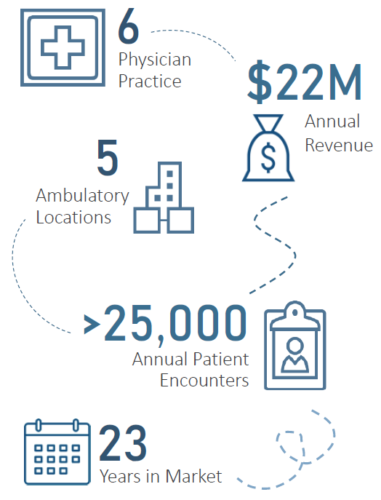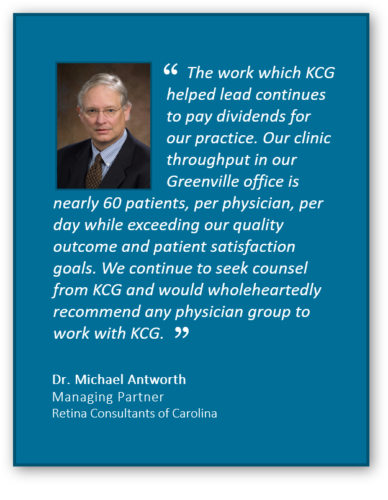Background
Retina Consultants of Carolina [RCC] is a six physician, five location Retina Ophthalmology practice in Northwestern South Carolina. Since its founding in 1994, RCC has experienced steady growth – both in patient volume and clinical staff.
As RCC contemplated its continued growth trajectory, leadership questioned whether a new, larger clinic space might be necessary. However, before incurring this expense, RCC sought to review clinic operations to identify whether opportunities existed to optimize throughput and performance within its existing space.
 The Solution
The Solution
RCC engaged Knowledge Capital Group [KCG] to facilitate a clinic optimization assessment, including an extensive evaluation of staff and physician workflows, roles, responsibilities, and supportive technology. Leveraging the findings of this assessment, KCG then developed and implemented a comprehensive plan to mitigate workflow constraints, drive clinic throughput, and optimize patient and provider experience. This plan focused on three key areas:

1. CLINIC LAYOUT: Although many of RCC’s patients suffered from impaired vision and mobility, the clinic’s physical layout required that patients cycle through multiple screening, exam, imaging, and treatment rooms during a standard clinic visit. To drive throughput and eliminate unnecessary movement of these patients, KCG worked with leadership to reconfigure the existing clinic layout – converting underutilized clinical and administrative workspaces into multi-purpose rooms. Not only did this enable the practice to improve patient experience, it also allowed RCC to realize greater operational efficiencies, clinic capacity and revenue potential – leveraging space strategically to streamline clinical delivery processes.
2. SCHEDULING TEMPLATES: Even with enhancements in clinical space utilization, RCC’s scheduling templates prevented the practice from operating with maximum efficiency. KCG redesigned & implemented customized, physician-centric scheduling templates that supported nuances in physician practice style, patient characteristics, acuity, encounter type and procedure-based workflows. The result was a scheduling template that created a more appropriate and consistent length of appointment, reduced wait times and increased daily clinic capacity.
3. STRATEGIC STAFFING: Historically, clinic staff at RCC were organized by clinical modality. As a result, a single patient appointment might require touch points with multiple technicians – creating inefficient handoffs throughout the visit cycle. To realize the full potential of the redesigned clinic space and scheduling templates, KCG implemented a strategic staffing model that re-organized ophthalmic technicians into clinical ‘pods.’ In this new model, all technicians completed training across all clinical modalities to ensure competence and coverage at all times, while driving operational efficiencies.







